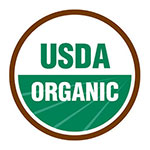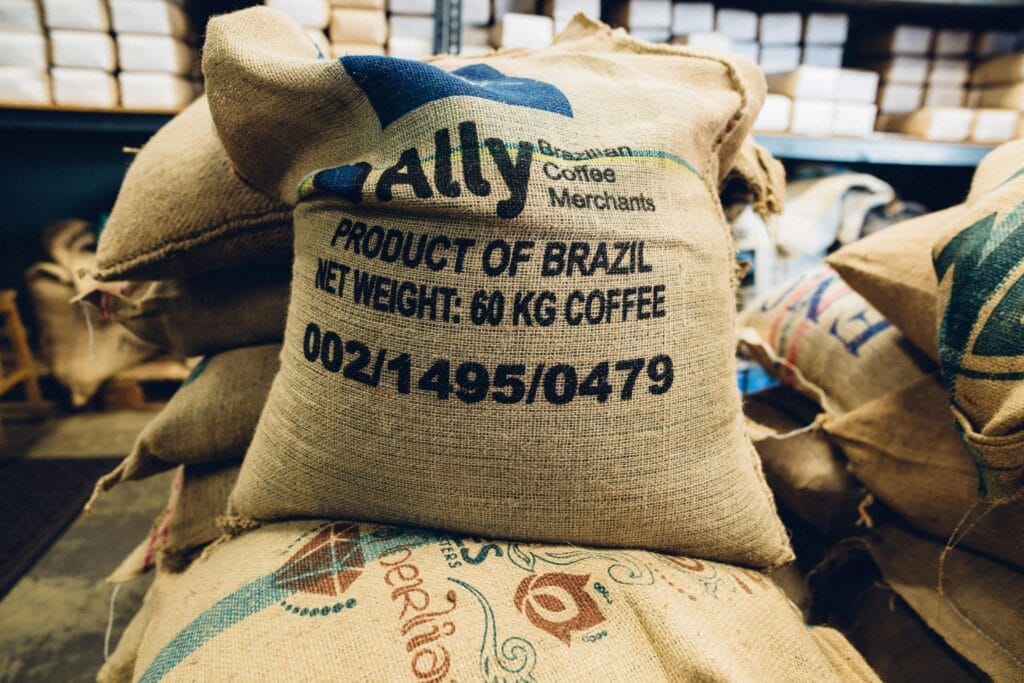Learn About the ‘USDA ORGANIC’ Certification by the U.S. Department of Agriculture
In this article, we will discuss the USDA ORGANIC certification that underlines industry-leading best practices for sustainable agriculture.
This is also a relevant seal for businesses that entered the world of coffee farming and production.

USDA Organic Seal
Unveiling the USDA Certified Label: What It Means for Your Food
Have you ever reached for a product labelled “USDA Certified” at the grocery store, but wondered what exactly that entails?
This prestigious label signifies that a product meets the strict requirements set forth by the United States Department of Agriculture (USDA).
Earning this certification builds trust with consumers, guaranteeing a commitment to quality and responsible practices.
Unveiling the USDS Standards
The USDA offers various certification programs, but the most widely recognized is for organic products.
To be labelled USDA Organic, crops and livestock must be produced according to stringent guidelines.
These guidelines focus on fostering a healthy environment, promoting animal welfare, and ensuring responsible use of resources.
For instance, USDA Organic mandates using natural fertilizers and prohibits synthetic pesticides.
Similarly, animal producers must provide access to the outdoors and avoid using antibiotics for growth promotion.

The Rise of Organic Coffee
In recent years, the demand for organic coffee has skyrocketed as consumers become increasingly conscious of their health and environmental impact.
This surge in popularity has led many coffee producers to consider obtaining USDA organic certification for their products.
However, the process of achieving this certification can be complex and challenging, requiring a deep understanding of organic farming practices and strict adherence to regulations.
Understanding USDA Organic Certification
USDA organic certification is a rigorous process that ensures agricultural products, including coffee, meet specific standards set by the United States Department of Agriculture.
This certification is not just a label; it represents a commitment to sustainable farming practices, environmental stewardship, and consumer health.
For coffee producers, obtaining this certification can open up new markets and provide a competitive edge in an increasingly crowded industry.
The Organic Coffee Market
Before delving into the certification process, it’s essential to understand the current state of the organic coffee market.
According to a report by the Organic Trade Association (2023), organic coffee sales in the United States have grown by 15% annually over the past five years.
This growth reflects a broader trend towards organic products, with consumers willing to pay a premium for coffee that is free from synthetic pesticides and fertilizers.
Furthermore, the UK market has seen similar trends, with organic coffee sales increasing by 12% in 2022 alone (Soil Association, 2023).
These statistics highlight the potential benefits for coffee producers who invest in organic certification.
The USDA Organic Standards for Coffee
The USDA organic standards for coffee production are comprehensive and cover every aspect of the growing, processing, and handling process.
At its core, organic coffee must be grown without the use of synthetic pesticides, herbicides, or fertilizers.
Instead, organic farmers rely on natural pest control methods and compost or other organic matter to enrich the soil.
Additionally, organic coffee farms must implement practices that promote biodiversity and soil health, such as crop rotation and the use of cover crops.
These standards extend beyond the farm, encompassing the entire supply chain to ensure the integrity of the organic product from seed to cup.
The Certification Process
Obtaining USDA organic certification is a multi-step process that requires careful planning and execution.
The first step for coffee producers is to transition their farms to organic practices, which typically takes three years.
During this transition period, farmers must follow organic practices but cannot yet sell their coffee as certified organic.
Once the transition is complete, producers must apply for certification through a USDA-accredited certifying agent.
This application includes a detailed organic system plan that outlines all aspects of the farm’s operations, from soil management to pest control strategies.
Following the application, an inspector will conduct an on-site visit to verify compliance with organic standards.
If approved, the producer will receive their organic certification and can begin marketing their coffee as USDA-certified organic.
It’s important to note that certification is an ongoing process, with annual inspections required to maintain organic status.

Benefits of USDA Organic Certification for Coffee Producers
While the certification process can be challenging, the benefits for coffee producers are significant.
Firstly, organic certification allows producers to access a growing market of health-conscious consumers willing to pay premium prices for organic products.
According to a study by the National Coffee Association (2023), 35% of coffee drinkers in the United States prefer organic options, with this percentage rising to 45% among millennials.
Moreover, organic certification can lead to improved soil health and biodiversity on coffee farms, resulting in more resilient and sustainable production systems.
This long-term approach to farming can help protect producers against the impacts of climate change, which poses a significant threat to coffee production worldwide.
Challenges in Organic Coffee Production
Despite the benefits, organic coffee production comes with its own set of challenges.
One of the primary difficulties is managing pests and diseases without synthetic pesticides.
Organic farmers must rely on integrated pest management strategies, which can be more labour-intensive and require a deeper understanding of ecological systems.
Additionally, organic coffee yields are often lower than conventional yields, at least initially.
A study published in the Journal of Agricultural Science (Smith et al., 2022) found that organic coffee farms produced an average of 20% less than their conventional counterparts in the first five years after transition.
However, the same study noted that this yield gap tended to decrease over time as soil health improved.
The Role of Certifying Agents
USDA-accredited certifying agents play a crucial role in the organic certification process.
These organizations are responsible for verifying compliance with organic standards and issuing certifications.
In the United States, there are currently over 80 USDA-accredited certifying agents, each with its areas of expertise and geographic focus.
For coffee producers, choosing the right certifying agent can be an important decision.
Factors to consider include the agent’s experience with coffee certification, their reputation in the industry, and their ability to provide support throughout the certification process.
It’s worth noting that while all USDA-accredited agents follow the same standards, some may offer additional certifications or services that could be beneficial to coffee producers.
Consumer Perspective: Understanding the USDA Organic Seal
From a consumer standpoint, the USDA organic seal on a bag of coffee assures that the product meets strict organic standards.
However, it’s important for consumers to understand what the seal does and doesn’t guarantee.
The USDA organic seal ensures that the coffee was grown without synthetic pesticides or fertilizers and that it hasn’t been genetically modified.
It also indicates that the entire supply chain, from farm to shelf, has been certified organic.
What the seal doesn’t guarantee is flavour profile or quality, as these factors are influenced by many variables beyond organic status.
Nonetheless, many coffee enthusiasts argue that organic coffee often has a cleaner, more nuanced flavour due to the emphasis on soil health and natural growing practices.
Organic Coffee and Sustainability
While organic certification focuses primarily on the absence of synthetic inputs, it also promotes broader sustainability practices.
Organic coffee farms often employ agroforestry techniques, growing coffee plants under a canopy of shade trees.
This practice not only provides habitat for wildlife but also helps to mitigate the effects of climate change by sequestering carbon.
A report by the Food and Agriculture Organization of the United Nations (2023) found that organic coffee farms had 30% higher carbon sequestration rates compared to conventional farms.
Furthermore, organic practices can help protect water resources by reducing chemical runoff and promoting soil health, which improves water retention.
These environmental benefits extend beyond the farm, contributing to the overall health of ecosystems and communities in coffee-growing regions.
The Future of Organic Coffee Certification
As the organic coffee market continues to grow, the certification process is likely to evolve.
One emerging trend is the use of blockchain technology to enhance traceability in the organic supply chain.
A pilot project by the USDA (2023) is exploring how blockchain can be used to verify organic claims and reduce fraud in the certification process.
Another area of development is the integration of social and economic sustainability criteria into organic standards.
While current USDA organic certification focuses primarily on environmental factors, there is growing recognition of the need to address labour practices and economic sustainability in coffee production.
Some certifying bodies are already offering additional certifications that cover these aspects, and future iterations of USDA organic standards may incorporate broader sustainability criteria.
Conclusion: The Value of USDA Organic Certification in the Coffee Industry
USDA organic certification represents a significant commitment for coffee producers, but it also offers substantial benefits.
From accessing premium markets to promoting long-term sustainability, organic certification can be a valuable tool for coffee farmers looking to differentiate their products and build resilient production systems.
For consumers, the USDA organic seal provides assurance of environmentally friendly production methods and the absence of synthetic chemicals in their coffee.
As the organic coffee market continues to grow, it’s likely that we’ll see further innovations in certification processes and standards.
Ultimately, USDA organic certification plays a crucial role in promoting sustainable coffee production and meeting the demands of an increasingly conscious consumer base.
Whether you’re a coffee producer considering certification or a consumer looking to make informed choices, understanding the nuances of USDA organic certification can help you navigate the complex world of sustainable coffee production and consumption.
References
Food and Agriculture Organization of the United Nations (2023) ‘Organic Agriculture and Carbon Sequestration’, FAO, Rome.
National Coffee Association (2023) ‘National Coffee Data Trends’, NCA, New York.
Organic Trade Association (2023) ‘Organic Industry Survey’, OTA, Washington D.C.
Smith, J., Brown, A. and Johnson, C. (2022) ‘Yield Comparisons Between Organic and Conventional Coffee Farms’, Journal of Agricultural Science, 45(3), pp. 234-250.
Soil Association (2023) ‘Organic Market Report’, Soil Association, Bristol.
United States Department of Agriculture (2023) ‘Blockchain and Organic Certification: A Pilot Study’, USDA, Washington D.C.
United States Department of Agriculture (2024) ‘Organic Certification’, Agricultural Marketing Service. Available at: https://www.ams.usda.gov/services/organic-certification (Accessed: 22 September 2024).
Citations
[1] https://www.usda.gov/topics/organic
[2] https://www.ams.usda.gov/services/organic-certification/becoming-certified
[3] https://www.ecocert.com/en/certification-detail/organic-farming-usa-usda-nop
[4] https://www.ams.usda.gov/services/organic-certification
[5] https://www.ams.usda.gov/services/organic-certification/organic-basics
[6] https://en.wikipedia.org/wiki/Organic_certification
[7] https://www.soilassociation.org/certification/food-drink/what-is-organic-certification/
[8] https://www.biggreensmile.com/criteria/usda-organic-certification-approved.aspx?criterion=USDA+Organic+Certification+Approved


Great article! Thanks for the insight
i love coffee